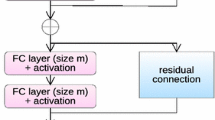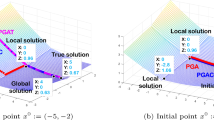Abstract
A hybrid iterative scheme that combines the Conjugate Gradient (CG) method with Richardson iteration is presented. This scheme is designed for the solution of linear systems of equations with a large sparse symmetric positive definite matrix. The purpose of the CG iterations is to improve an available approximate solution, as well as to determine an interval that contains all, or at least most, of the eigenvalues of the matrix. This interval is used to compute iteration parameters for Richardson iteration. The attraction of the hybrid scheme is that most of the iterations are carried out by the Richardson method, the simplicity of which makes efficient implementation on modern computers possible. Moreover, the hybrid scheme yields, at no additional computational cost, accurate estimates of the extreme eigenvalues of the matrix. Knowledge of these eigenvalues is essential in some applications.
Similar content being viewed by others
References
C. Brezinski and M. Redivo-Zaglia, Hybrid procedures for solving linear systems, Numer. Math. 67 (1994) 1–19.
D. Calvetti, G. H. Golub and L. Reichel, Gaussian quadrature applied to adaptive Chebyshev methods, in:Recent Advances in Iterative Methods, eds. G. Golub, A. Greenbaum and M. Luskin (Springer, New York, 1994), pp. 31–44.
D. Calvetti and L. Reichel, Adaptive Richardson iteration based on Leja points, J. Comp. Appl. Math., to appear.
P. Concus, G. H. Golub and D. P. O'Leary, A generalized conjugate gradient method for the numerical solution of elliptic partial differential equations, in:Sparse Matrix Computations, eds. J. R. Bunch and D. J. Rose (Academic Press, New York, 1976) pp. 309–332.
T. A. Davis, Finite element analysis of the Landau-de Gennes minimization problem for liquid crystals in confinement, Ph.D. Thesis, Department of Mathematics and Computer Science, Kent State University, Kent, OH (1994).
J. E. Dennis and R. B. Schnabel,Numerical Methods for Unconstrained Optimization and Nonlinear Equations (Prentice-Hall, Englewood Cliffs, 1983).
J. J. Dongarra, I. S. Duff, D. C. Sorensen and H. A. van der Vorst,Solving Linear Systems on Vector and Shared Memory Computers. (SIAM, Philadelphia, 1991).
A. Edrei, Sur les déterminants récurrents et les singularités d'une fonction donnée par son developpement de Taylor, Composito Math. 7 (1939) 20–88.
H. C. Elman, Y. Saad and P. E. Saylor, A hybrid Chebyshev Krylov subspace algorithm for solving nonsymmetric systems of linear equations, SIAM J. Sci. Statist. Comp. 7 (1986) 840–855.
G. H. Golub and M. D. Kent, Estimates of eigenvalues for iterative methods, Math. Comp. 53 (1989) 619–626.
G. H. Golub and C. F. Van Loan,Matrix Computations, 2nd ed. (Johns Hopkins University Press, Baltimore, 1989).
G. H. Golub and R. S. Varga, Chebyshev semi-iterative methods, successive over-relaxation methods, and second order Richardson iterative methods, Numer. Math. 3 (1961) 147–168.
G. H. Golub and J. H. Welsch, Calculation of Gauss quadrature rules, Math. Comp. 23 (1969) 221–230.
L. A. Hageman and D. M. Young,Applied Iterative Methods, (Academic Press, New York, 1981).
F. Leja, Sur certaines suits liées aux ensembles plans et leur application à la representation conforme, Ann. Polon. Math. 4 (1957) 8–13.
N. M. Nachtigal, L. Reichel and L. N. Trefethen, A hybrid GMRES algorithm for nonsymmetric linear systems, SIAM J. Matrix Anal. Appl. 13 (1992) 796–825.
D. P. O'Leary, Hybrid conjugate gradient algorithms, Ph.D. thesis, Computer Science Department, Stanford University, Stanford, CA (1975).
C. C. Paige, B. N. Parlett and H. A. van der Vorst, Approximate solutions and eigenvalue bounds from Krylov subspaces, Numer. Lin. Alg. Appl., to appear.
L. Reichel, The application of Leja points to Richardson iteration and polynomial preconditioning, Lin. Alg. Appl. 154–156 (1991) 389–414.
H. Rutishauser, Theory of gradient methods, in:Refined Iterative Methods for Computation of the Solution and the Eigenvalues of Self-Adjoint Boundary Value Problems, eds. M. Engeli, Th. Ginsburg, H. Rutishauser and E. Stiefel (Birkhäuser, Basel, 1959) pp. 24–49.
P. E. Saylor, Leapfrog variants of iterative methods for linear algebraic equations, J. Comp. Appl. Math. 24 (1988) 169–193.
R. S. Varga,Matrix Iterative Analysis (Prentice-Hall, Englewood Cliffs, 1962).
Author information
Authors and Affiliations
Additional information
Research supported in part by NSF grant DMS-9409422.
Research supported in part by NSF grant DMS-9205531.
Rights and permissions
About this article
Cite this article
Calvetti, D., Reichel, L. A hybrid iterative method for symmetric positive definite linear systems. Numer Algor 11, 79–98 (1996). https://doi.org/10.1007/BF02142490
Issue Date:
DOI: https://doi.org/10.1007/BF02142490




